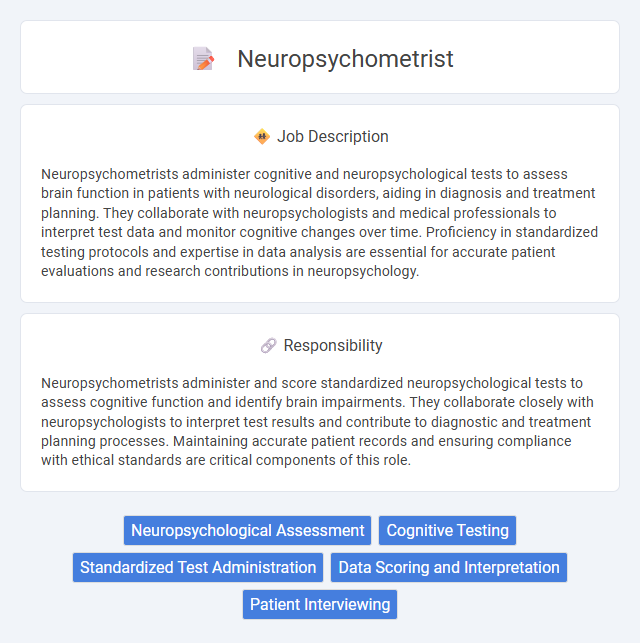
Neuropsychometrists administer cognitive and neuropsychological tests to assess brain function in patients with neurological disorders, aiding in diagnosis and treatment planning. They collaborate with neuropsychologists and medical professionals to interpret test data and monitor cognitive changes over time. Proficiency in standardized testing protocols and expertise in data analysis are essential for accurate patient evaluations and research contributions in neuropsychology.
Individuals with strong analytical skills and an interest in brain-behavior relationships are likely to succeed as neuropsychometrists, as the role involves administering and interpreting cognitive tests for neurological conditions. Those comfortable working in clinical or research settings, often under pressure to provide accurate assessments for patients with brain injuries or neurodegenerative diseases, may find this career path suitable. However, candidates who struggle with detailed data management or have low tolerance for emotionally challenging situations might face difficulties in this profession.
Qualification
A Neuropsychometrist must hold a bachelor's degree in psychology, neuroscience, or a related field, with many employers preferring candidates with specialized training or certification in neuropsychological testing. Strong skills in administering, scoring, and interpreting complex neuropsychological assessments and familiarity with brain-behavior relationships are essential. Proven experience with patient interaction, data collection, and maintaining rigorous testing protocols is critical for ensuring accurate cognitive and behavioral evaluations.
Responsibility
Neuropsychometrists administer and score standardized neuropsychological tests to assess cognitive function and identify brain impairments. They collaborate closely with neuropsychologists to interpret test results and contribute to diagnostic and treatment planning processes. Maintaining accurate patient records and ensuring compliance with ethical standards are critical components of this role.
Benefit
A career as a neuropsychometrist likely offers significant benefits such as hands-on experience in cognitive assessment and direct collaboration with neuropsychologists. This role probably enhances skills in administering and scoring neuropsychological tests, which may increase employability in clinical and research settings. Opportunities for professional growth and involvement in cutting-edge neurological research could also be common advantages.
Challenge
The role of a neuropsychometrist likely involves significant challenges related to administering complex cognitive and psychological assessments with precision. There is a probability that ensuring accurate data collection while maintaining patient comfort and cooperation requires advanced interpersonal and technical skills. Navigating diverse patient responses and adapting testing procedures in real time may also present frequent challenges in this specialized field.
Career Advancement
Neuropsychometrists specialized in administering cognitive and psychological tests for brain function assessment can advance their careers by pursuing advanced certifications such as the Certified Brain Injury Specialist (CBIS) or obtaining a master's degree in neuropsychology or clinical neuropsychology. Gaining experience in research settings or clinical trials enhances opportunities for leadership roles in neuropsychological evaluation teams or positions as clinical coordinators. Mastery of cutting-edge neuropsychological testing technologies and proficiency in data analysis software significantly boost prospects for career growth and higher salary brackets.
Key Terms
Neuropsychological Assessment
Neuropsychometrists specialize in conducting neuropsychological assessments to evaluate cognitive function, memory, attention, and executive skills in patients with neurological conditions. They administer standardized tests and interpret quantitative data to assist in diagnosing brain injuries, neurodegenerative diseases, and psychiatric disorders. Their expertise supports clinical decision-making and the development of personalized treatment plans based on comprehensive neurocognitive profiles.
Cognitive Testing
Neuropsychometrists specialize in administering and interpreting cognitive tests that assess memory, attention, language, and executive functioning to support neurological and psychological evaluations. Precise administration of standardized neuropsychological assessments ensures accurate measurement of brain function in patients with conditions such as traumatic brain injury, dementia, or stroke. Proficiency in data scoring, analysis, and detailed reporting facilitates informed clinical decision-making and treatment planning.
Standardized Test Administration
Neuropsychometrists specialize in the administration of standardized neuropsychological tests to assess cognitive functions such as memory, attention, and executive functioning. Accurate test administration and scoring are critical for diagnosing neurological conditions and guiding treatment plans. Proficiency in using validated tools like the WAIS-IV, WMS-IV, and D-KEFS ensures reliable data collection and interpretation for clinical and research purposes.
Data Scoring and Interpretation
Neuropsychometrists specialize in data scoring and interpretation by analyzing cognitive, behavioral, and neurological test results to assess brain function and diagnose conditions. They ensure accurate data entry, apply standardized scoring protocols, and interpret patterns to support clinical evaluations and research. Their expertise in handling complex data sets enhances diagnostic precision and informs treatment planning for neurological and psychological disorders.
Patient Interviewing
Neuropsychometrists conduct detailed patient interviewing to assess cognitive, emotional, and behavioral functions, gathering vital information for accurate neuropsychological evaluations. They utilize structured and clinical interview techniques to understand patients' medical history, symptoms, and daily functioning. Effective patient interviewing by neuropsychometrists directly influences diagnostic accuracy and the development of personalized treatment plans.
 kuljobs.com
kuljobs.com